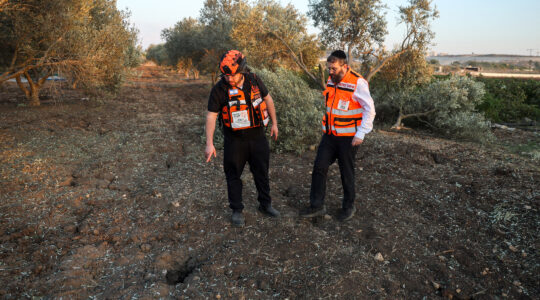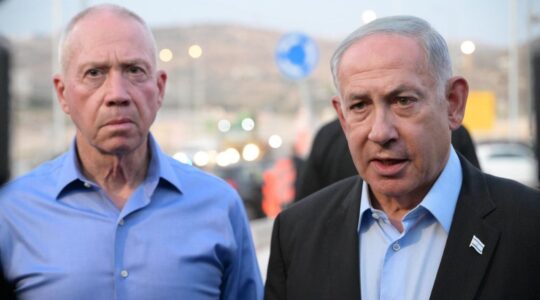JERUSALEM (JTA) – For the first time since the Annapolis peace parley last November, the United States is leaning heavily on Israel to move ahead in peacemaking with the Palestinians.
This week, on her second visit to Israel and the Palestinian areas in a month, U.S. Secretary of State Condoleezza Rice secured a long list of Israeli commitments designed to improve Palestinian living conditions and indicated that the United States would make sure Israel carried them out.
The Americans seem intent on achieving tangible progress on the ground before President Bush’s second visit to Israel this year, scheduled for May to coincide with Israel’s 60th anniversary celebrations.
To pre-empt further U.S. pressure, the Israelis were keen to show progress is being made in negotiations with the Palestinians on the core issues of borders, Jerusalem, security and Palestinian refugees.
Israel wants to show it is doing all it can to reach a peace deal by the end of 2008 – the target date set at Annapolis.
A day before Rice’s arrival, strategic government leaks to the Israeli media disclosed that Foreign Minister Tzipi Livni and former Palestinian Authority Prime Minister Ahmad Qureia have held more than 50 unpublicized working meetings since Annapolis. All the core issues, including Jerusalem, have been on the table.
During her visit, Rice focused on conditions on the ground.
“I really do think that what we have to do is to have meaningful progress towards a better life for the Palestinian people,” Rice declared upon her arrival in Jerusalem.
After a three-way meeting with Rice, Israeli Defense Minister Ehud Barak and P.A. Prime Minister Salam Fayyad, Israel announced a package of measures to ease restrictions on Palestinian movement in the West Bank, improve the quality of Palestinian life, boost the Palestinian economy and help Palestinian security forces keep law and order.
The measures included:
* dismantling 50 roadblocks around the West Bank cities of Jenin, Tulkarm, Kalkilya and Ramallah;
* streamlining operations at the remaining 500 or so Israeli roadblocks in the West Bank;
* dismantling a permanent checkpoint near Jericho, giving Palestinians direct access to the Dead Sea;
* allowing the construction of 5,000 to 8,000 new Palestinian homes in some 25 villages in the Ramallah area, a project that has been on hold for more than a year;
* connecting Palestinian villages without electricity to the Israeli power grid;
* allowing another 5,000 Palestinian workers to work in Israel, bringing the total number permitted to do so to 23,500;
* issuing permits to another 500 Palestinian businessmen, enabling a total of 1,500 Palestinians to move in and out of Israel on business;
* providing Israeli support for development programs and foreign investment in the West Bank;
* allowing 700 Palestinian security police to move into Jenin to maintain law and order – a similar contingent is already at work in Nablus;
* allowing the supply of 125 vehicles and 25 Russian-made armored personnel carriers to Palestinian security forces;
* and building dozens of Palestinian police stations across the West Bank to operate under Israeli supervision and ultimate security control.
Barak aides say he decided to provide the large package at once rather than incrementally to give it a more dramatic effect on the ground.
Israel’s goal is not only to impress the Americans but to alleviate growing Palestinian restiveness. Some observers warn that failure to make such changes on the ground could prompt a third intifada.
Despite Israel’s promises, Palestinian leaders remained skeptical.
“I will believe it when I see it,” declared Saeb Erakat, one of the chief Palestinian negotiators.
Israeli media are skeptical as well. A cartoon in Israel’s daily Yediot Achronot showed Rice riding a slow Barak-faced tortoise, saying to Bush on the phone, “Boss, we are making fantastic progress.”
Whether or not the Israeli moves constitute significant progress, Rice is determined to see that they are carried out “very, very soon.”
U.S. Gen. William Fraser will monitor and verify implementation.
“General Fraser will ensure that 50 roadblocks will be removed and that this will actually have an effect on the freedom of movement in the West Bank,” Rice declared.
Israel’s next steps will depend on Palestinian terrorists. If there is more terrorism, the roadblocks will go back up. If there is not, Israel says more will come down.
On the negotiations front, it seems Israeli and Palestinian negotiators are holding far more intense and extensive discussion than the public on either side was told.
Away from the public eye, Livni and Qureia have been meeting discreetly in Jerusalem twice or three times a week for the past several months. Officials in the know say negotiations this intense haven’t been held since the initial Oslo talks in the early 1990s.
Like the Oslo talks, the Livni-Qureia meetings have been shrouded in secrecy. Both apparently agreed early on to steer clear of the cameras and not to issue progress reports of any kind.
Nothing of substance has been leaked to the media. Some reports have said the meetings include maps, the occasional participation of experts and follow-ups by professionals on both sides.
The aim is produce a detailed Israeli-Palestinian agreement to be approved by the United Nations by the end of the year and be implemented as soon as conditions allow.
For now it is clear to all the parties that as long as Hamas remains in control of the Gaza Strip, and until the Palestinian Authority demonstrates it can stop attacks against Israel, the agreement will remain on the shelf.
The big unknown is how much genuine progress, if any, Livni and Qureia have been able to make.
Clearly, as Rice said, the better the situation on the ground, the more concessions the parties will feel ready to make on the big issues.
That’s why Rice went to Israel: to secure concessions and move things forward. Time will tell whether these changes hold up.

Help ensure Jewish news remains accessible to all. Your donation to the Jewish Telegraphic Agency powers the trusted journalism that has connected Jewish communities worldwide for more than 100 years. With your help, JTA can continue to deliver vital news and insights. Donate today.





